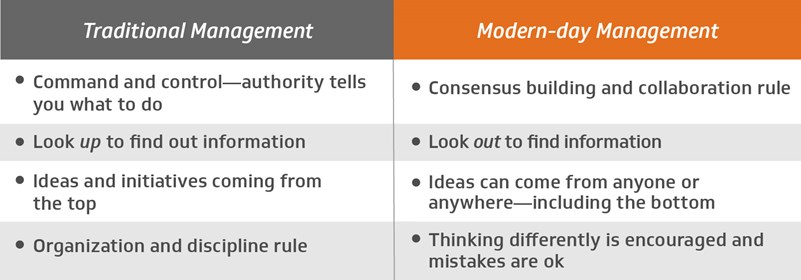
PUBLISHED JUNE 26, 2017
How to Make a Difference as a Millennial Manager
I’m a millennial. I’m also a manager.
(Disclaimer: I understand that some of you may stop reading because I used the word “millennial.” I realize that all people born within a particular time span don’t necessarily share the same traits. But, stick with me – you may still get something out of this article.)
Before transitioning from an individual contributor to managing a team, I had no idea how challenging this responsibility would be.
Three years ago, I became a manager for the first time. I remember recruiting for my first team in 2014. I was just as nervous as the candidates I interviewed. Was I asking the right questions? What if I hired the wrong person? I worried about retention as I onboarded and trained my team during their first few weeks.

If you are like many millennial managers, you want to be an incredible leader whom people want to follow.
You want to inspire your team to accomplish things they didn’t think they could do! Before becoming a manager, you may have pushed yourself to excel all your life – and your new role is no different. You still have high expectations.
You want to manage like a boss.
As a first-time manager, you may be nervous. This is unknown territory, and you don’t want to mess this up or disappoint yourself.
The good news is: you’ve got a choice in how great of a leader you will be. Take stock of your strengths and weaknesses. Approach management like you’ve approached other challenges in life – grab this bull by its horns!
First, recall your favorite managers.
How did they push you to succeed? What parts of their management style do you want to adopt, and which parts do you want to avoid like the plague? Think back to managers you respected. How did they treat you? Did they take the time to get to know you? How often did you communicate? Did they take credit for your work, or were they quick to give you props and recognize you in front of your peers?
Taking time for this upfront work to connect with your management ideals is a valuable starting point for a first-time manager.
During my first few months as a manager, I remember going to Barnes & Noble and browsing the “management” row. I scanned through books, contemplating what type of manager I was going to be. Wondering who I would model my style after, I left the store with a nervous knot in my stomach.
I was looking out, not looking in.
Had I started with reflection about my values, my personality and my strengths and weaknesses, I would have saved time and energy. I am a stronger leader today because I am true to myself and own my traits – good, bad and ugly. I’m not trying to be anyone else – which is very “millennial” of me, don’t you think?
Rewrite the traditional rules of management.
Growing up in a world that is constantly evolving, we expect our workplace to be no different. If something doesn’t make sense to us, we don’t want to do it. We want a rewarding work environment, and if we find ourselves in a less-than-ideal work culture, we may work to instill new values.

In my previous job as a recruiter, we had weekly team meetings to update our manager on our progress. All eight of us took turns rattling off details about how many candidates we emailed, how many we submitted to the hiring manager and how many interviews we scheduled for the following week. When it wasn’t our turn, we remained quiet and waited patiently. The 30-minute meeting went by without any collaboration or idea sharing. We could have simply emailed our updates, instead of waiting for our 2 minutes to give them verbally. And what’s worse – we weren’t leveraging all the brain power in the room to solve our challenges and learn together.
This didn’t make sense to me, and I spoke up.
I met with my manager and suggested that we extend our 30-minute weekly meeting to 60 minutes. Instead of only supplying updates, we spent a few more minutes discussing the challenges we were facing and shared ideas on how to solve them. Over time, our team’s culture shifted. We were provided a weekly opportunity to brainstorm and were encouraged to help one another. Not only did we bond over our shared struggles, but we also became a smarter, more efficient team who produced better results.
In my quest to be a strong leader, I remember stories such as this one and implement lessons learned. My team’s weekly calls include time to brainstorm with another. We are stronger together!
JB Training Solutions surveyed millennial managers about the differences between traditional rules of management and modern-day management style.

Do the phrases on the right resonate with you more than the phrases on the left? Consider your organization’s culture and the culture you are perpetuating for your team. You may not have much control over the former, but you can shape the latter!

As managers of millennials, it’s important to realize that our employees may not care about working their way up the corporate ladder. The traditional notion of working long hours in the same job, hoping to make a few extra bucks as you climb the ranks, is not the goal. Our generation is replacing the one-way career ladder with career scaffolding, a multiplatform teeming with job options. In today’s gig economy, we can try out different jobs, take on less responsibility if we need to, or completely switch careers.
A few years ago, I came to a fork in the road. My professional experience included a concentration in recruiting and social media, and I felt I had one foot in each profession. I had the experience and qualifications to go down either path and focus solely on recruiting or social media.
I came to the realization that it was not an “either/or” decision. I did not have to choose which career ladder to climb. I could carve out my own path!
I was recruited for my next role which was a perfect blend of recruiting and social media. I combined my two areas of expertise and became the first ever Social Media and Talent Acquisition Senior Manager at Kforce.
As managers, it is our responsibility to empower our people to move through the career scaffolding. Have open dialogues with your employees and regular check-ins, asking things like:
- Do you still enjoy what you’re doing?
- What do you want to learn?
- Do you feel you have opportunities to learn?
- Do you feel like you’re making an impact?
- Where do you see yourself in 5 years?
It’s important to many of us that we are always learning, improving our skills and making an impact. As a manager, are you empowering your team to achieve that?
Kforce millennial Kerri Potter emphasizes the importance of these types of conversations between manager and employee. “I appreciate a manager who invests time in my career, not just my to-do list,” Potter said. “I’m happiest when there’s open communication about my goals, even if it includes something outside of my job description. I left my previous role due to lack of communication with my boss and accepted the current one mostly based on the conversations I had with the hiring manager. She was a good listener, and I knew she’d be a motivating mentor.”
Don’t let technology impede meaningful connections.

Regularly connecting with your team should be one of your top priorities as a manager – but I don’t mean sending them one-liners asking them how their day is going.
Most millennials consider themselves digital natives, growing up with technology and the Internet. Many of us are comfortable texting, tweeting or Facebook messaging our co-workers. In our hyperconnected world, digital communication is second nature, and we continue to incorporate new technology into the way we connect with others.
However, our affinity for digital communication can be a barrier to meaningful connections at work.
On an average day, 39 percent of millennials interact with their phones more than they do with people, a 2016 Bank of America consumer study reports. Nearly 44 percent of Americans also use their mobile devices to avoid social interaction, with millennials more likely to do so at 71 percent.
“Because this digital age makes it so easy to avoid human interaction, it’s critical that managers establish rapport with their employees,” says Kforce millennial Kristan McCants. “Scheduling regular 1:1’s or simply grabbing a coffee during a work break are just a few ways to establish a level of trust and understanding with colleagues.”
Emails and text messages can be suitable forms of communication with our employees in many cases, but in other situations, it’s important to connect face-to-face. Digital communication eliminates body language and tone of voice – two aspects of communication essential for human connection.
If you cannot have an in-person conversation, pick up the phone – especially when providing your employee with constructive criticism. I have learned the hard way that emails can get misinterpreted. There is a risk that comes with communicating digitally, so be mindful of this and communicate offline especially during times it’s important that you and your employee understand one another.

Some of us cringe when we hear the word “feedback,” especially if we are new managers! We may worry about the risks, such as demotivating our team and making our employees feel defeated. You picture someone visibly upset in their office after your performance review. Maybe you worry that after giving direct feedback, he or she will march right back to their desk and write his or her resignation letter.
As managers, it is our responsibility to provide meaningful feedback.
Feedback should be specific and occur immediately after an event. Don’t wait to two weeks to say, “Amanda, great job on the presentation you did for our client.” Delayed feedback that is neither specific or timely doesn’t provide much value. Amanda won’t know why you think she did a great job and since so many days have passed, she may not remember the details of the presentation. It is more effective to say something like “You did a great job on the presentation because you presented data that was easy for our client to understand and included information that you predicted would resonate with your audience.”
Think about your favorite managers. Did they tiptoe around you, only saying positive things about your work and never suggesting ways to improve? Or did they give you direct, detailed suggestions and encourage you along the way?

One of my favorite managers gave me constructive criticism that I took to heart – and her guidance is still helping me be a better leader to this day. She said “Allison, I know you have really high standards and want our team’s work to be the best it can be. However, when you share blunt feedback on your teammate’s work over email, you could unintentionally hurt their feelings and cause damage to your relationships. Next time, pick up the phone and discuss your ideas.”
I had no idea I was hurting feelings and damaging relationships with people I care about. Had my manager not given feedback, I may still be doing that today! Picking up the phone instead of sending an email is a better option in many situations, and I’m thankful she encouraged me to do that.
As an intern, Kforce millennial Paige Robinson says never to view feedback negatively. “At the start of my internship, my manager told me that no one will care about your career more than you. Ask for feedback because that’s one way you can grow as a young professional. Don’t fear feedback, rely on it and learn from it.”
If your goal, as a manager, is to foster skilled professionals, ensure that your feedback is insightful and actionable. Employees value direct, detailed suggestions.
High achievers want feedback. High achievers who are also millennials crave it!
Consider the ROI of your management.
Many of us are “middle managers.” We manage a team of individual contributors, have our individual responsibilities and have a boss. It may be challenging to zoom out and consider the expectations, goals, KPIs, etc. for each member of your team, for you and your boss. To maximize your ROI as a manager, you need to consider all three. What does your team need to achieve this week, quarter and year? What are your objectives? What about your manager’s? That’s a lot of balls to juggle, right?
This is where the art and science of delegation come in. Perhaps you are used to doing it all on your own. You think: If I want a job done right, I must do it myself.
However, if you empower your team and get out of their way, you will get much more accomplished than if you go at it alone.
This is where trust comes in. For your team to achieve success, you have to trust them.

Perhaps you are worried that if left unattended your team will disappoint and make you, your department or your company look bad. So, you swoop in and take over, tightening your control with white knuckles. Now you’re working 14-hour days because you are doing your job and their job. Eventually, you burn out, miss deadlines and produce shoddy work. And, you have taken the wind out of your team’s sails, and they don’t want to work for you.
You would have been better off if you trusted your team to do the work you hired them to do.
Offer just enough guidance to get employees on their way.
Do you provide a sense of autonomy and foster an environment where creativity is encouraged?
Are you familiar with the term “design thinking”? My colleague Nicole Ferrer encourages leaders to implement design thinking into our leadership style. She explains: “[Design thinking leaders] are the creative forces who develop systems and services that enable the growth of not only their team, but the entire organization.”
Do not stifle your team’s creativity by micromanaging.
As you are introducing a new project to your employee, make time to discuss it with him. Be available as he or he has questions, and then get out of the way and let them work.
Take ownership of the success – and duress – of your team.
Being a manager comes with a heaping portion of accountability. We need to lead by example and hold ourselves accountable for the many successes and failures in the workplace. There will always be circumstances beyond your control. People make mistakes, technology fails, and there are some people we just can’t win over.
But when the stuff hits the fan – how do you, the manager, respond?
As an individual contributor, you only needed to worry about yourself. You’re a manager now, and are responsible for a team– and you cannot sidestep responsibility and hide behind consensus. If something goes wrong, dedicate time and focus on understanding what happened. We will make many mistakes, and it’s important to learn from it and move on.

The transition from individual contributor to manager has pushed me to learn new skills quickly. The traits that I share with many people around my age – including a love for collaboration, desire to empower others and hunger for breaking through limits – shape the type of leader I am becoming. Managing a team has its fair share of challenges, but the constant challenge to improve my leadership skills is satisfying.
To my fellow millennial managers – you’ve got this! Being an inspiring leader is a choice, and you have what it takes.
Manage like a boss.
